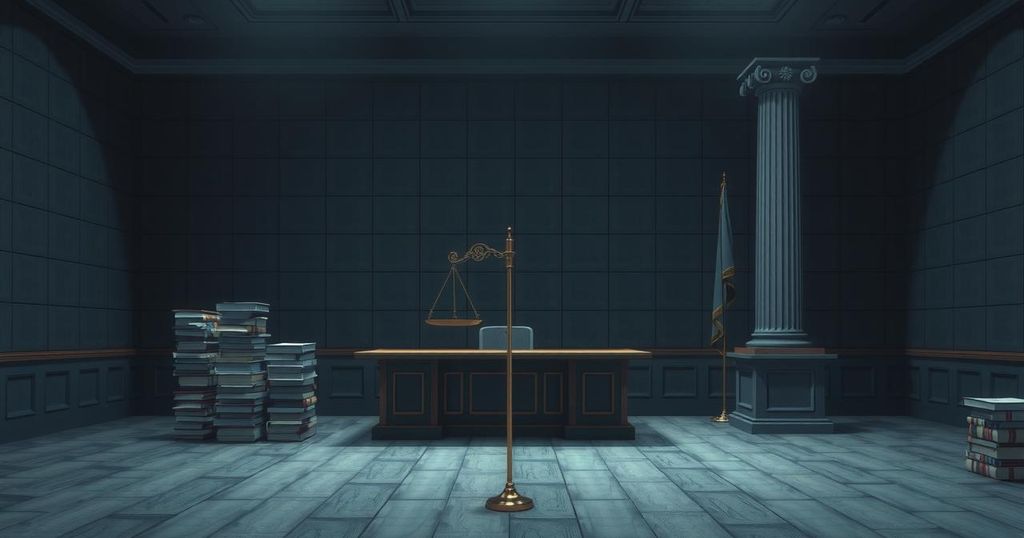Gambian Torture Victims Testify in Denver Against Former Military Officer
In Denver, Pharing Sanyang, a torture victim from Gambia, testified against Michael Sang Correa, a former military soldier, detailing horrific abuses endured during a failed coup attempt against dictator Yahya Jammeh. Correa faces charges under U.S. law for his involvement in the torture of Sanyang and others. Other alleged victims also testified, shedding light on the actions of Jammeh’s military unit, the Junglers, and the ongoing quest for justice and accountability.
In a courtroom in Denver, a former officer from Gambia’s military, Pharing Sanyang, vividly recounted his harrowing experience of torture. Testifying against Michael Sang Correa, one of the soldiers implicated in his maltreatment, Sanyang described brutal attacks that included being beaten with metal pipes and branches. This incident traces back to a coup attempt nearly two decades ago against Yahya Jammeh, the long-time dictator of Gambia.
While detailing his ordeal, Sanyang shared how he suffered severe physical damage due to the assault. He highlighted a striking part of his testimony, explaining how sand from a courtyard lodged in his eyes during a beating, leading to several needed surgeries. Under the U.S. legal framework, Correa is on trial for torture, facing charges that relate to Sanyang and four others who were targeted under his command.
In what has become a significant legal case, Correa is being prosecuted under a U.S. law allowing for the prosecution of torture committed overseas. The case underscores the ongoing challenges in holding perpetrators accountable for human rights abuses. Sanyang described a horrifying moment when he was pressured to provide a false confession while he was bleeding from injuries inflicted during interrogations. He illustrated the lengths he was forced to go to in order to survive, stating, “I had to save my body,” emphasizing his position within a failed coup.
Having spent nearly a decade imprisoned on treason charges, Sanyang resettled in Senegal after his release, only to find himself back in the spotlight as an eyewitness in a foreign court. On the other hand, Correa’s journey to the U.S. began as a bodyguard for Jammeh. Post-regime, he overstayed his visa and eventually settled in Denver as a laborer.
Sanyang was not alone in telling his story. Other alleged victims also made the journey to testify, painting a chilling picture of the torture endured at the hands of the Junglers, Jammeh’s notorious military unit. Jurors were shown graphic evidence, including photos of injuries sustained by victims like bayonet wounds and cigarette burns. Together, these men sought justice amidst lingering trauma.
Despite Correa’s lawyers admitting to his involvement in Sanyang’s tortures, they insist he was a low-ranking private, forced to follow orders under threat of violence. This argument struggles to stand against the testimonies of those like Demba Dem, who spoke candidly about his torturous experiences. Dem described a harrowing episode of asphyxiation with a plastic bag while beaten, detailing the severe psychological and physical toll.
Living in the Netherlands now, Dem expressed a mix of reluctance and relief to testify in court against his abusers. He stated, “I have to do it but I feel satisfied,” underscoring the complex emotions tied to seeking justice for past traumas. As the trial progresses, it remains a critical moment for survivors holding perpetrators accountable for their actions, which are often met with claims of denial and deflection.
This trial is part of a broader movement toward justice for those abused during Jammeh’s regime. A recent truth commission in Gambia recommended prosecuting those responsible for state-sanctioned violence, and other countries have taken steps to hold individuals accountable. With ongoing legal actions in Europe against officials connected to Jammeh’s rule, the court discussions in Denver may signify a growing commitment to human rights on global platforms, some hope lingering for closure and justice for past offenses.
The trial of Michael Sang Correa in Denver draws attention to the serious issue of accountability for human rights abuses in Gambia under Yahya Jammeh’s dictatorship. Testimonies like those of Pharing Sanyang and Demba Dem reveal the brutal tactics employed against alleged coup plotters, while the legal proceedings represent a significant effort towards achieving justice for torture victims. As the trial continues, it reflects a growing global consciousness and determination to address past atrocities, highlighting the need for continued vigilance against such acts in the future.
Original Source: www.denverpost.com




Post Comment